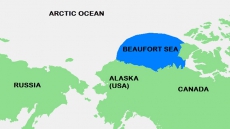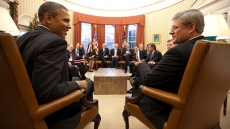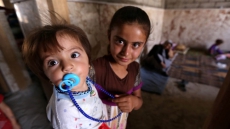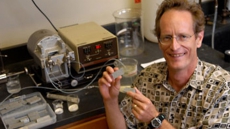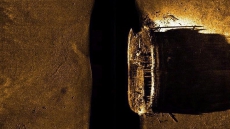KAMLOOPS, B.C. — A year's worth of hard work and fundraising efforts by a group of students from Kamloops, B.C., have gone up in flames with the spectacular explosion of a commercial rocket bound for the International Space Station.
Just six seconds after liftoff Tuesday evening, the rocket launched from the Orbital Sciences Corp.'s complex in eastern Virginia exploded, destroying a payload of equipment that included the experiments of students from across North America.
On board was a microgravity experiment developed by four boys who attended McGowan Park elementary school in Kamloops last year and are now in Grade 8.
Paul Hembling, the project co-ordinator for the Kamloops-Thompson school district and principal of Bert Edwards Science and Technology School, left a meeting just in time to watch the liftoff and explosion.
“The first thing I thought was, 'I want my $25,000 back,'” Hembling said of the money he and others in the school district raised to help pay for the opportunity to have their students' creations head to space.
"We basically paid $25,000 to pay for that explosion to launch our experiment along with 17 others from all other U.S. jurisdictions," he said with a chuckle, adding McGowan Park was the only Canadian school involved in the flight.
The experiment was designed to examine how space impacts the growth of crystals, and Hembling said it involved silicon tubes, 17 centimetres long and 0.9 centimetres in diameter.
Two separate solutions were inside the tubes and were separated by clips, he said.
Once the experiment was aboard the space station, the astronauts were supposed to remove a clip, allowing the solutions to mix and the crystals to form, Hembling said, noting a similar experiment was to take place on Earth at about the same time.
The experiment was supposed to return to earth in about 12 weeks, at which time the students could compare the results.
The students hypothesized the structure of the crystals formed in space would be different, Hembling said.
A summary of the experiment also proposed that unique materials could be created on Earth if scientists could better understand the formation of solids from liquids in space. It also said scientists would get a better understanding of how fluid mixing and crystal formation works in microgravity.
Hembling said he hopes the explosion won't mean the end of the experiment and that there will be another opportunity for the project.
The cost was for the transportation of the materials by rocket to the space station, not the silicon tubes and clips, he said.
Raising the money proved to be a half-time job for Hembling, who also had to write a proposal and apply on behalf of the school district to get a spot on the flight.
In the end, the students still learned a lot from their involvement, he said.
“Nobody got hurt, there was a huge explosion, lots of flames and the boys can say, ‘I have been involved in a NASA disaster.' What’s not to like from a boy’s perspective?”
Kieren O’Neil said in an email to The Canadian Press that he was one of the students who spent the last year designing the experiment and was watching the launch when the explosion occurred.
"We feel bad for everyone involved," he said, adding that he's been told the project will still happen.
Flames could be seen shooting into the sky as the sun set. There was no hint of any trouble until the rocket exploded.
Orbital Science reported that everyone at the site had been accounted for, and the damage appeared to be limited to the facilities.
"We will understand what happened — hopefully soon — and we'll get things back on track," Orbital Sciences' executive vice-president Frank Culbertson told his team an hour after the failure. "We've all seen this happen in our business before, and we've all seen the teams recover from this, and we will do the same."
Tuesday was the second launch attempt for the mission.
Monday evening's try was thwarted by a stray sailboat in the rocket's danger zone. The restrictions are in case of just such an accident that occurred Tuesday.
Hembling said the project was important because it engaged students.
"We need to engage kids in science to make the learning real for them and to make the learning relevant," he said.
"I can't think of anything that is with more purpose or more real than having a NASA astronaut carry out your designed space experiment on the International Space Station."

